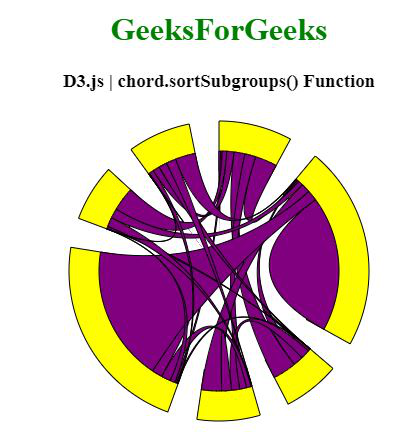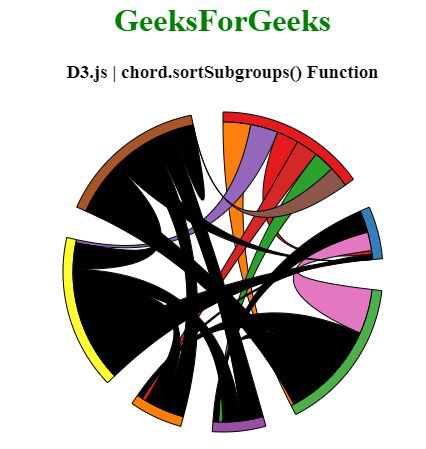D3.js中的chord.sortSubgroups()函數用於將子組比較器設置為指定函數或為null,並返回此和弦布局。
用法:
chord.sortSubgroups([compare]);
參數:該函數接受如上所述和以下描述的單個參數:
- compare:此參數是設置子組比較器的函數。
返回值:此函數返回和弦布局。
以下示例程序旨在說明D3.js中的chord.sortSubgroups()函數
範例1:
<!DOCTYPE html>
<html>
<head>
<meta charset="utf-8">
<script src="https://d3js.org/d3.v4.js"></script>
</head>
<body>
<center>
<h1 style="color:green;">GeeksForGeeks</h1>
<h3>D3.js | chord.sortSubgroups() Function</h3>
<div id="GFG"></div>
<script>
// Create the svg area
var svg = d3.select("#GFG")
.append("svg")
.attr("width", 320)
.attr("height", 320)
.append("g")
.attr("transform", "translate(160, 160)")
// Create input data
var data = [[ 10, 161, 80, 80, 12, 34, 53],
[13, 990, 9, 69, 76, 35, 4],
[175, 71, 16, 68, 0, 0, 3],
[51, 148, 60, 71, 34, 5, 1],
[13, 990, 9, 69, 76, 35, 4],
[175, 71, 16, 68, 0, 0, 3],
[51, 148, 60, 71, 34, 5, 1]];
// Give this matrix to d3.chord()
var chords = d3.chord()
.padAngle(0.2)
// Use of chord.sortSubgroups() Function
.sortSubgroups(d3.ascending)
(data)
svg.datum(chords)
.append("g")
.selectAll("g")
.data(function (d) { return d.groups; })
.enter()
.append("g")
.append("path")
.style("fill", "yellow")
.style("stroke", "black")
.attr("d", d3.arc()
.innerRadius(100)
.outerRadius(150)
)
svg.datum(chords)
.append("g")
.selectAll("path")
.data(function (d) { return d; })
.enter()
.append("path")
.attr("d", d3.ribbon()
.radius(120)
)
.style("fill", "purple")
.style("stroke", "black");
</script>
</center>
</body>
</html> 輸出:

範例2:
<!DOCTYPE html>
<html>
<head>
<meta charset="utf-8">
<script src= "https://d3js.org/d3.v4.min.js"></script>
<script src= "https://d3js.org/d3-color.v1.min.js">
</script>
<script src=
"https://d3js.org/d3-interpolate.v1.min.js">
</script>
<script src=
"https://d3js.org/d3-scale-chromatic.v1.min.js">
</script>
</head>
<body>
<center>
<h1 style="color:green;">GeeksForGeeks</h1>
<h3>D3.js | chord.sortSubgroups() Function</h3>
<div id="GFG"></div>
<script>
// Create the svg area
var svg = d3.select("#GFG")
.append("svg")
.attr("width", 340)
.attr("height", 340)
.append("g")
.attr("transform", "translate(170, 170)")
// Create input data
var data = [[0, 71, 89, 68, 71, 89, 68],
[ 11, 0, 60, 71, 9, 9, 0],
[ 10, 145, 0, 85, 145, 0, 85],
[ 13, 9, 9, 0, 0, 60, 71],
[ 13, 9, 9, 0, 0, 60, 71],
[ 10, 145, 0, 85, 145, 0, 85],
[0, 71, 89, 68, 71, 89, 68]];
// 4 groups, so create a vector of 4 colors
var colors_1 = [d3.schemeSet1[0],
d3.schemeCategory10[1],
d3.schemeCategory10[2], d3.schemeCategory10[3],
d3.schemeCategory10[4], d3.schemeCategory10[5],
d3.schemeCategory10[6]];
var colors = [d3.schemeSet1[0], d3.schemeSet1[1],
d3.schemeSet1[2], d3.schemeSet1[3],
d3.schemeSet1[4], d3.schemeSet1[5],
d3.schemeSet1[6]];
// Give this matrix to d3.chord()
var chords = d3.chord()
.padAngle(0.2)
// Use of chord.sortSubgroups() Function
.sortSubgroups(d3.descending)
(data)
svg.datum(chords)
.append("g")
.selectAll("g")
.data(function (d) { return d.groups; })
.enter()
.append("g")
.append("path")
.style("fill", function (d, i) {
return colors[i]
})
.style("stroke", "black")
.attr("d", d3.arc()
.innerRadius(150)
.outerRadius(160)
)
svg.datum(chords)
.append("g")
.selectAll("path")
.data(function (d) { return d; })
.enter()
.append("path")
.attr("d", d3.ribbon()
.radius(150)
)
.style("fill", function (d, i) {
return colors_1[i]
})
.style("stroke", "black");
</script>
</center>
</body>
</html>輸出:

相關用法
- PHP Ds\Set add()用法及代碼示例
- PHP each()用法及代碼示例
- PHP Ds\Map put()用法及代碼示例
- PHP Ds\Set first()用法及代碼示例
- PHP Ds\Set last()用法及代碼示例
- d3.js d3.map.set()用法及代碼示例
- p5.js pan()用法及代碼示例
- p5.js value()用法及代碼示例
- PHP Ds\Map xor()用法及代碼示例
- PHP Ds\Set contains()用法及代碼示例
- PHP Ds\Set xor()用法及代碼示例
- d3.js lch()用法及代碼示例
- d3.js d3.max()用法及代碼示例
- p5.js hue()用法及代碼示例
- p5.js min()用法及代碼示例
- p5.js red()用法及代碼示例
注:本文由純淨天空篩選整理自SHUBHAMSINGH10大神的英文原創作品 D3.js chord.sortSubgroups() Function。非經特殊聲明,原始代碼版權歸原作者所有,本譯文未經允許或授權,請勿轉載或複製。
